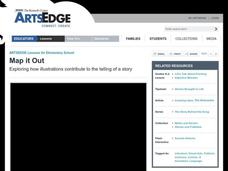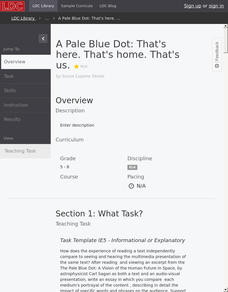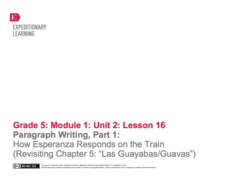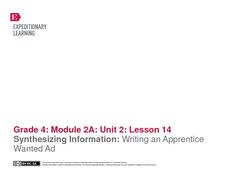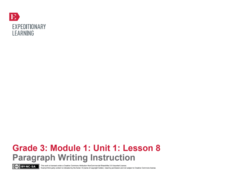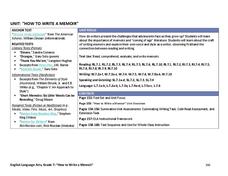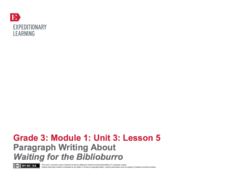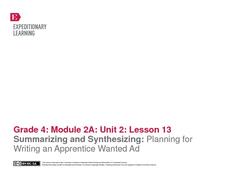Curated OER
Water Cycle Reading and Writing
Here is a great way to get pupils to express a scientific concept in a fun way. After hearing the story of Walter the Water drop and learning facts about the water cycle, the class will write a creative expository piece describing what...
Curated OER
Nonfiction Genre Mini-Unit: Persuasive Writing
Should primary graders have their own computers? Should animals be kept in captivity? Young writers learn how to develop and support a claim in this short unit on persuasive writing.
Curated OER
Only the Facts
Practice the strategy of summarizing to gain meaning and knowledge from an informational text. Young readers highlight supporting details and main ideas, and then they use this to summarize two articles: "The Great Quake" and "What is an...
Curated OER
Words in the News: Stem Cell Research
A thorough resource for intermediate English learners addresses reading comprehension of informational texts, adjective forms, vocabulary acquisition, and writing in a journalistic style. Specifically, the class reads about stem cell...
Curated OER
Map It Out
Explore how illustrations add to a story. Young learners will look at picture books to see how the pictures tell the story. They create illustrations to go with a chosen story, and then flip the activity so they have to write a story to...
Curated OER
Advertising in the Contemporary World: An Introduction to Persuasive Texts
Beginning a persuasive writing unit with your middle schoolers? Approach it through something that persuades us all: advertising! Through studying video and print advertisement, your class will practice Common Core skills for reading...
Curated OER
Get in the Newspaper Habit
Dive into journalism with your high schoolers! The resources provided here will help your learners write unbiased, clear, and succinct newspaper articles. First they spend time sifting through stacks of articles, filling out a graphic...
Literacy Design Collaborative
A Pale Blue Dot: That's Here. That's Home. That's Us.
21st-century learners live in such a visual world that many are unused to letting their minds imagine the picture that words create. An excerpt from Carl Sagan's lecture, "The Pale Blue Dot: A Vision of the Human Future in Space,"...
EngageNY
Paragraph Writing, Part 1: How Esperanza Responds on the Train (Revisiting Chapter 5: "Las Guayabas/Guavas")
When your class members have completed the novel Esperanza Rising, they will be ready to write an expository essay on how Esperanza responds to events and what this says about her character. Set your pupils up for success by starting out...
EngageNY
Synthesizing Information: Writing an Apprentice Wanted Ad
Fourth graders view examples of help-wanted ads as they plan and create their own writing in the fourteenth instructional activity of this unit on colonial trade. The engagement of the class is captured when the teacher shares an actual...
EngageNY
Paragraph Writing Instruction
Writing a paragraph from details found directly in a text is the central focus of this thorough and explicit lesson plan. Using the stories Nasreen's Secret School and Rain School, third graders are lead step-by-step through the basics...
Louisiana Department of Education
How to Write a Memoir
Who are we and what shapes our identities? Seventh graders work to answer this question as they learn how to write a memoir. Full of non-print resources and supplemental texts that range from fiction to non-fiction, scholars write their...
Curated OER
Discovering Saturn, The Real "Lord of the Rings"
Reading, writing, and rings! A lesson from NASA combines space science with authentic reading and writing tasks. Included in this lesson are pre-reading activities, four mini informational booklets on Saturn, a structured note-taking...
EngageNY
Main Ideas in Informational Text: Analyzing a Firsthand Human Rights Account for Connections to Specific Articles of the UDHR
Lesson 10 in a series of human rights lessons focuses on the skills of finding evidence and summarizing. Your young readers work to compare the two texts they have read in this unit: the Universal Declaration of Human Rights...
EngageNY
Paragraph Writing About Waiting for the Biblioburro
Ask your learners to synthesize what they know about Waiting for the Biblioburro by writing a well-organized paragraph. Young writers focus on using transition words and including specific details in their paragraphs. The plan allows for...
EngageNY
Summarizing and Synthesizing: Planning for Writing an Apprentice Wanted Ad
In instructional activity 13 of this unit on colonial trade, young researchers learn about apprentices as they prepare to write help-wanted ads for the specific trade they have been researching. To begin, the class listens closely as the...
EngageNY
Paragraph Writing: The Role of Religion in Colonial America
Informative writing is emphasized in the standards. Help your learners reach that goal with the plan for paragraph writing outlined here. After reviewing the work from the day before and adding to their vocabulary notebooks, class...
University of Delaware
Constructing Text-Based Arguments About Social Issues
Eighth graders take a stand on a variety of controversial topics with a lesson on argumentative writing. As they view an informative presentation and work with collaborative groups, they decide which side of each argument they want to...
ReadWriteThink
What is Poetry? Contrasting Poetry and Prose
Introduce middle schoolers to the different strategies used when reading prose versus poetry. Groups use a Venn diagram and a poetry analysis handout to compare the characteristics of an informational text and a poem on the same subject...
EngageNY
Mid-Unit 2 Assessment: On-Demand Informational Writing
Lesson 7 focuses on building academic vocabulary and writing an explanatory letter with supported textual evidence. For the first five minutes of the instructional activity, the educator reminds the class of how to read and refer to the...
English Enhanced Scope and Sequence
Differentiate between Formal and Informal Language
The Pledge of Allegiance, the Gettysburg Address, the National Anthem, and the Preamble to the Constitution all get close attention in an exercise that asks learners to rewrite these formally-worded documents into informal language....
Curated OER
Note-Taking: K.I.S.S. "Keep It Short and Simple"
Note-taking is an essential study skill, and it needs to be taught! In the context of a research project on energy sources, learners find multiple sources, evaluating, paraphrasing, and citing them correctly. Two lists with note-taking...
EngageNY
Writing a First Draft: Accessing Books Around the World Informative Paragraph
Supervise the final drafting of a well-organized paragraph by following the steps outlined in this plan. Using the included sample paragraph as a model, class members brainstorm criteria for quality work and then compose their paragraphs...
EngageNY
Revising: Strong Conclusions for My Accessing Books Around the World Informative Paragraph
It's important that writers leave their readers with a strong and satisfying conclusion. Help your young writers develop the skills to compose a concluding sentence with the steps outlined here. After class members have had a chance to...






